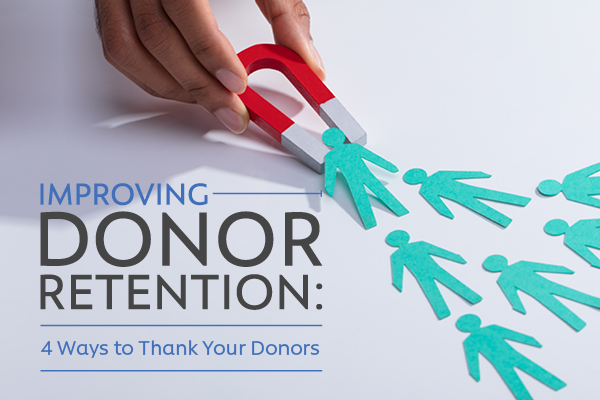Grant Cobb, GivingMail | April 21, 2021
Improving Donor Retention: 4 Ways to Thank Your Donors
Nonprofits professionals know that every donation matters. And while most nonprofits are aware of the importance of retaining donors, those that take a closer look at the investment cost that goes into attracting and converting supporters reap the benefits. There’s no doubt that one-off donations are still helpful for your nonprofit’s fundraising efforts, but the return on investment of constantly marketing to new donors pales when compared to that of retaining donors.
Improving your nonprofit’s donor retention rate also makes your marketing efforts more cost-effective. Each time your nonprofit makes contact with a new donor, you must walk them through every step of the donor conversion process. Once they reach the final step of giving to your organization, convincing them to stick around and donate again next month both improves your nonprofit’s marketing investment and creates a reliable revenue stream for your nonprofit.
Check out these on demand webinars to learn more about the power of recurring giving.
The question, then, is how do you get donors to stay invested in your nonprofit? Our team at GivingMail is experienced with both nonprofit digital campaigns and direct mail appeals, and we’ve found that cultivating relationships with donors revolves around showing your appreciation for their support with meaningful displays of gratitude.
Saying “thank you” sounds simple, but it quickly becomes more complicated when you take into account different kinds of donors and their unique relationships with your nonprofit. To help your fundraising team understand how to approach donors and express gratitude, we’ll walk through best practices on how to:
- Send Thank You Cards
- Host Donor Appreciation Events
- Spotlight Major Donors
- Create a Donor Wall
Remember that when you thank your donors, the goal is to strengthen their connection with your nonprofit. Think about how each document builds on your current relationship and offers further opportunities for engagement and participation in your nonprofit’s community.
1. Send Thank You Cards
Thank you cards are a relatively standard way to show your thanks, but that doesn’t mean they aren’t effective at making donors feel appreciated. Sending monthly donors routine thank you cards is also a low-cost way to repeatedly show your gratitude and keep your nonprofit in the back of their minds.
Donors who have been with your nonprofit for long periods of time are particularly good candidates for thank you cards. Traditional mail appeals can help strengthen your nonprofit’s relationship with donors by including personal details such as:
-
Their name. Including a donor’s name over a generic “Dear Donor” greeting lets donors know that you see them as individuals. Use your donor database or CRM to track your donors’ personal information so every thank you card created is addressed to the right person, sent to the right address, and customized to reflect their relationship with your nonprofit.
-
Their donation history. How much have they donated in the past? Have they given to a specific campaign? Donors want to know the impact of their specific donations, so reference which program they donated to and what their support accomplished to make them feel like an integral part of your nonprofit’s success.
-
Additional participation in your nonprofit. Some donors attend events, volunteer, or engage in other ways with your nonprofit. By referencing these details in your thank you card, donors will feel they are getting a truly unique message from a nonprofit that cares about their support.
According to 360MatchPro’s fundraising statistics report, 91 percent of organizations stop acknowledging recurring gifts after three months. While a donor’s support is rarely contingent solely on being thanked, receiving regular thank yous for months to then be greeted with silence can be a bit jarring. Show your donors that you care about them no matter how long they’ve been with your nonprofit by continually showing your appreciation after each donation.
2. Host Donor Appreciation Events
Fundraising events are not only opportunities to earn donations, they also allow your nonprofit to strengthen its relationships with current donors. In addition to mingling with donors at your regular events, consider hosting special events specifically for donors.
A good example of a high-value fundraiser that warrants a donor celebration event is a capital campaign. Capital campaigns often end with celebratory parties as a thank you to everyone who participated, with special honors given to the major donors who contributed the bulk of the funds raised.
Take a moment during your events to recognize your donors through speeches and toasts. In some instances, you can offer a general thank you to all donors (such as after a crowdfunding campaign), while other situations require specific, personalized recognition. For example, at an auction, be sure to take the time to honor the various businesses that contributed items or monetary support to the event.
Above all, at your donor appreciation events, be sure to give your guests something to do other than donate. Activities outside of giving help donors feel like they are part of a community rather than a money dispenser. Creating a memorable experience can be its own reward as donors are likely to spread the word about the fun event they attended with family and friends.
3. Spotlight Major Donors
Your nonprofit has multiple communication tools at its disposal, and many of them can be used to showcase a specific contribution made by a major donor. Remember to check with donors ahead of time before spotlighting them, as some will feel flattered by the attention, while others will be less comfortable with public recognition.
After getting the okay from your donors, determine which of your communication channels you want to use to highlight your high-end givers. Check your nonprofit database to determine your major donors’ preferred communication channels so they’ll be sure to see their spotlight once it’s posted.
Some of the most common ways to spotlight donors are:
-
Social media. Social media posts tend to be shorter, but they also have a larger audience and are easily accessible. Your donor can promote their nonprofit involvement to their friends and family by interacting with your posts. Include an eye-catching photo or image and be sure to communicate the specific impact of your donor’s contribution, so anyone who scrolls past can quickly understand who your donor is and why his/her/their support matters.
-
Your newsletter. Whether your newsletter is digital or physical, it likely has the space to add a donor of the month/week section. By doing so, you can routinely showcase donors to your nonprofit’s community. Making your spotlights a regular part of your nonprofit’s communication can make some donors feel less shy about being recognized or even inspire others in the community to get themselves on the front page of your newsletter.
-
Your website. Similar to your newsletter, your nonprofit can dedicate a section of its website towards honoring donors. You can create an entire page specifically to acknowledge key donors or, if you have a blog, you can use that channel to routinely highlight donors. Continually updating your website to spotlight donors also shows site visitors that your nonprofit is active and receiving a healthy amount of funding, which can encourage them to continue supporting your mission.
These donor spotlight ideas tend to be low-cost and also provide an opportunity to strengthen your connections with donors by collecting brief biographies or asking them to articulate what your nonprofit means to them. Donors then feel recognized by both your nonprofit and your community, which can lead to continued participation in events, fundraisers, and other activities.
4. Create a Donor Wall
While every donor deserves a thank you, major contributors often require more than a well-worded email. At the end of major fundraising campaigns such as capital campaigns, take a moment to assess your key donors and plan how to show your appreciation in a memorable, lasting way.
One common strategy for retaining major donors is to create a donor wall. Donor walls are physical structures, usually housed in your nonprofit’s headquarters, that list the names of important donors. Donor walls vary in size, shape, and requirements for being honored on the wall.
For example, some nonprofits create a monetary cut-off point for recognition while others choose to erect donor walls for specific campaigns and thus acknowledge the donors who gave specifically to that campaign or program.
Donor walls are permanent and require a greater investment of resources than other forms of donor appreciation, so be sure to conduct your research and talk to consultants before constructing one. You can find inspiration for what you want in a donor wall by looking to other nonprofits and using online resources like this one to check out examples you may not be able to see in person.
____________________________________________________
Focusing on donor retention is a sustainable fundraising strategy that helps your nonprofit create reliable revenue streams. One of the most effective ways to convince donors to stay with your nonprofit is to say “thank you,” and show your appreciation for their support. Take a look at each donor’s history with your nonprofit to determine the most successful way to thank them, whether that’s through a traditional card or a large-scale donor wall.
About the author: Grant Cobb is a fundraising specialist with over 6 years of experience in the nonprofit space. Currently the head of marketing and analytics at GivingMail, he is a huge proponent of data-driven decision making and the push to bring high-level analytics and fundraising to all.

Get Resources and Insights Straight To Your Inbox
Explore More Articles
International Self Care Day
Today, July 24, 2025, we celebrate International Self Care Day, a day dedicated to promoting self-care practices and their numerous benefits for physical, mental, and…
Read ArticleHow the “Big Beautiful Bill” Will Impact Individual Giving and Employer-Sponsored Workplace Giving Programs
The One Big Beautiful Bill was signed into law on July 4, 2025, introducing a range of provisions that will affect how individuals, companies, and…
Read ArticleGet Resources and Insights Straight To Your Inbox
Receive our monthly/bi-monthly newsletter filled with information about causes, nonprofit impact, and topics important for corporate social responsibility and employee engagement professionals, including disaster response, workplace giving, matching gifts, employee assistance funds, volunteering, scholarship award program management, grantmaking, and other philanthropic initiatives.





